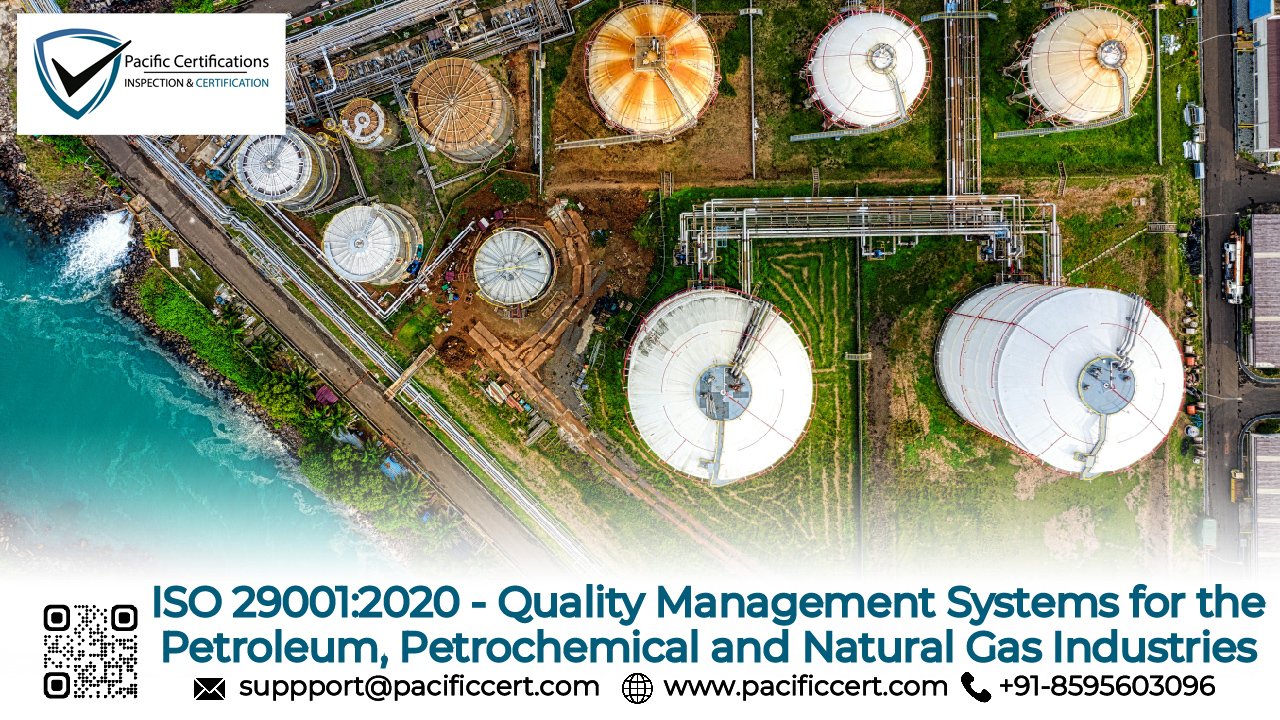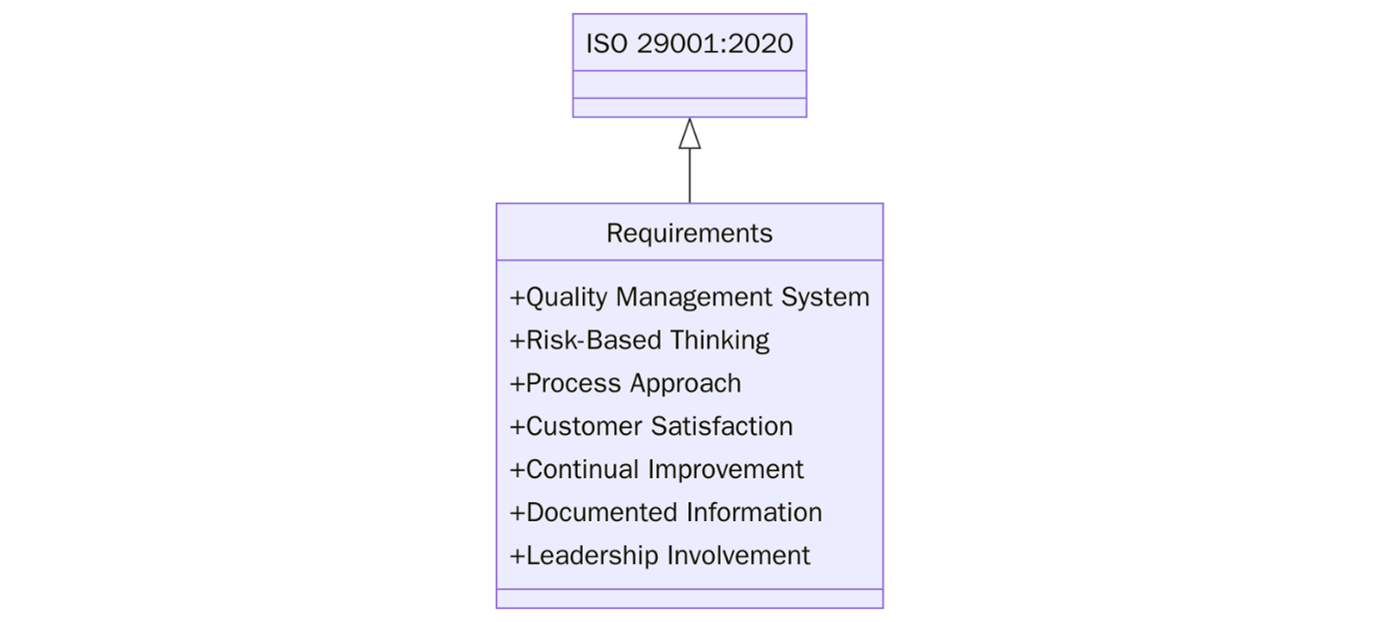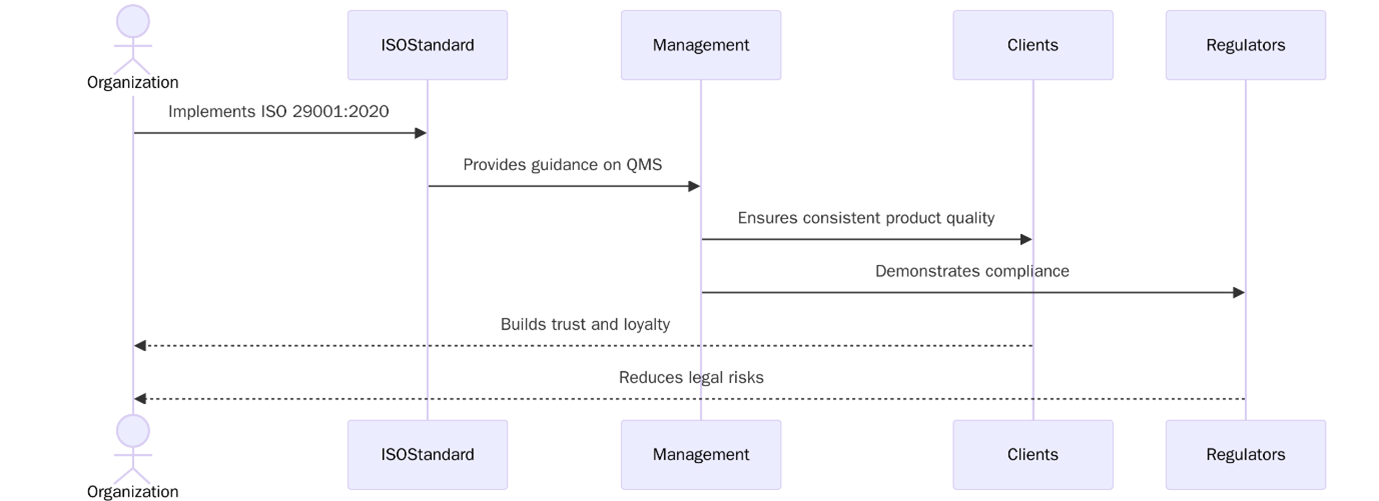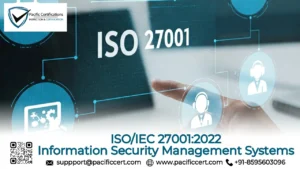What is ISO 29001:2020?

ISO 29001:2020 is an international standard that specifies quality management system (QMS) requirements specifically for product and service supply organizations in the petroleum, petrochemical, and natural gas industries. It builds on the foundation of ISO 9001:2015 by incorporating additional, sector-specific requirements for risk-based thinking, defect prevention, and supply chain management.
This standard ensures that suppliers in the oil and gas sector can consistently provide products and services that meet both customer expectations and applicable statutory and regulatory requirements. ISO 29001 aims to reduce supply chain variation and waste while enhancing operational reliability, safety, and environmental protection.
For ISO 29001 implementation support or certification assistance, contact us at support@pacificcert.com.
Scope and Applicability
ISO 29001:2020 applies to organizations of all sizes that provide products or services to the petroleum, petrochemical, or natural gas industries, including:

- Equipment manufacturers (valves, pumps, drilling tools etc)
- Engineering, procurement, and construction (EPC) firms
- Service providers in transportation, inspection, maintenance, or calibration
- Subcontractors and third-party suppliers in the energy sector supply chain
It is particularly relevant for upstream, midstream, and downstream operators who require a uniform approach to supplier qualification and quality assurance.
Contact us at support@pacificcert.com to know more about ISO 29001 certification process!
Certification Process
ISO 29001 certification involves:
- Gap Analysis – Review current QMS practices against ISO 29001 requirements
- System Development – Design or enhance the QMS to include industry-specific controls
- Documentation – Develop procedures, process maps, and risk registers
- Training – Train teams on quality assurance, process audits, and sector-specific guidelines
- Internal Audit – Conduct audits to verify compliance and address gaps
- Certification Audit – Undergo third-party audit for certification issuance
Certification is valid for three years with annual surveillance audits.
How to Implement ISO 29001:2020 in Your Organization?
- Define the Scope of QMS: Identify which products, services, or sites fall under the certification.
- Conduct Risk Assessments: Evaluate operational, product, and supplier risks relevant to the oil and gas sector.
- Develop Quality Objectives: Align objectives with industry KPIs, such as nonconformance rates, delivery performance, and HSE compliance.
- Document Key Processes: Ensure procedures cover product realization, supplier evaluation, change control, and defect management.
- Monitor and Measure Performance: Use tools like FMEA, root cause analysis, and statistical process control.
- Continuous Improvement: Integrate CAPA (Corrective and Preventive Actions), customer feedback, and lessons learned from audits.
Need help with a customized certification roadmap for your operations? We at Pacific Certifications can support your team from system design to certification readiness. Reach out to support@pacificcert.com to get started!
Documentation Required
- Quality Manual aligned with ISO 9001 and ISO 29001
- Sector-specific process control procedures
- Risk management and defect prevention plans
- Supplier selection, audit, and performance evaluation criteria
- Design validation and change control documentation
- Incident reports, nonconformity logs, and root cause analysis
- Internal audit and management review reports
For certification consulting, please contact us at support@pacificcert.com
Eligibility Criteria
ISO 29001 is suitable for:
- Companies in the oil and gas value chain (exploration, drilling, refining, etc.)
- Manufacturers supplying critical components or systems
- Engineering and maintenance service providers
- Logistics or storage firms handling petroleum-based products
Whether your organization is a prime contractor or a small niche supplier, ISO 29001 can enhance market access and client confidence.
Not sure if your organization qualifies or how to define scope? Contact Pacific Certifications at support@pacificcert.com for a free consultation to determine ISO 29001 eligibility and planning!
Certification Costs
Certification costs depend on:
- Organizational size and number of sites
- Scope of operations (design, manufacturing, servicing, etc)
- Number and complexity of processes
- Level of integration with other management systems
- Current maturity of QMS and audit readiness
We conduct a preliminary review to provide accurate quotations based on your unique situation. To receive a detailed, tailored quotation based on your scope and needs, reach out to us at support@pacificcert.com.
Certification Timeline
Week | Key Activities |
Week 1 | Scope definition, gap analysis, project planning |
Week 2 | Draft documentation and define controls for sector-specific risks |
Week 3 | Implement quality procedures and conduct awareness training |
Week 4 | Perform internal audits and address nonconformities |
Week 5 | Management review and final adjustments |
Week 6 | External certification audit and issue of ISO 29001 certificate |
We at Pacific Certifications can guide you through this timeline with expert-led planning, documentation, and pre-certification audits. Email us at support@pacificcert.com for scheduling support!
Requirements of ISO 29001:2020
ISO 29001 incorporates all clauses from ISO 9001:2015, with additional industry-specific enhancements:

- Defect Prevention: Emphasis on designing and controlling processes to avoid defects at the source.
- Supply Chain Management: Stronger focus on evaluating and controlling suppliers and subcontractors.
- Risk-Based Thinking: Structured approach to identifying, analyzing, and mitigating industry-specific risks.
- Traceability: Stringent documentation and tracking of components and services.
- Standardization: Ensures uniform quality processes across multinational operations.
Our team at Pacific Certifications can help you interpret and implement each requirement correctly—contact support@pacificcert.com for expert guidance.
Benefits of ISO 29001:2020
- Minimizes failures and enhances trust in high-risk environments
- Accelerates vendor onboarding and strengthens procurement efficiency
- Reduces operational and safety risks through preventive quality assurance
- Facilitates entry into global supply chains where ISO 29001 is a requirement
- Supports adherence to industry codes, safety guidelines, and local standards
- Minimizes rework, product recalls, and non-conformance penalties
- Can be easily integrated with ISO 9001, ISO 14001, ISO 45001, and HSE frameworks

The energy sector is undergoing transformation with increased focus on ESG (Environmental, Social, Governance), digitalization, and operational efficiency. According to a recent industry outlook by McKinsey & Company and recent data published in IOGP (International Association of Oil & Gas Producers) Quality Report, over 75% of global oil and gas operators now mandate ISO-aligned QMS for critical suppliers. Additionally, more than 60% of upstream and EPC firms reported ISO 29001 compliance as a competitive advantage in tenders and joint ventures.
ISO 29001 supports global initiatives such as:
- API Q1/Q2 standards alignment (commonly required by North American clients)
- Supplier certification for offshore and onshore exploration projects
- Digital traceability for pipeline integrity and equipment servicing
The standard is gaining traction in emerging markets and among EPC firms bidding for international contracts.
Let our team at Pacific Certifications help you translate these trends into strategic quality initiatives. Reach us at support@pacificcert.com.
How Pacific Certifications Can Help?
We at Pacific Certifications offer comprehensive services for ISO 29001:2020 audit and certification:
- Readiness assessment and industry gap analysis
- Documentation drafting tailored to oil and gas processes
- Training for engineers, QHSE managers, and internal auditors
- Internal audit execution and CAPA system support
- Certification audit coordination and post-audit follow-up
If you’re looking to implement ISO 29001:2020, align your QMS with petroleum and gas sector requirements, or require professional certification assistance, our team at Pacific Certifications is ready to support you from start to finish. We offer personalized guidance, full documentation audits and integration with your existing systems.
Contact us today at support@pacificcert.com to begin your ISO 29001 certification journey!
FAQ on ISO 29001:2020
Is ISO 29001 certifiable?
Yes, it is certifiable by an accredited third-party body.
Does it replace ISO 9001?
No. It builds on ISO 9001 with additional oil and gas-specific requirements.
Who should implement ISO 29001?
Suppliers, manufacturers, EPCs, and service firms in the petroleum and gas industries.
Can it be integrated with other standards?
Yes. It aligns with ISO 14001, ISO 45001, and ISO 50001, among others.
Is it required by oil majors?
Often yes. Many major oil companies list ISO 29001 as a prequalification or contract requirement.
Ready to get ISO 29001:2020 certified?
Contact Pacific Certifications to begin your certification journey today!
Suggested Certifications –
Read more: Pacific Blogs






